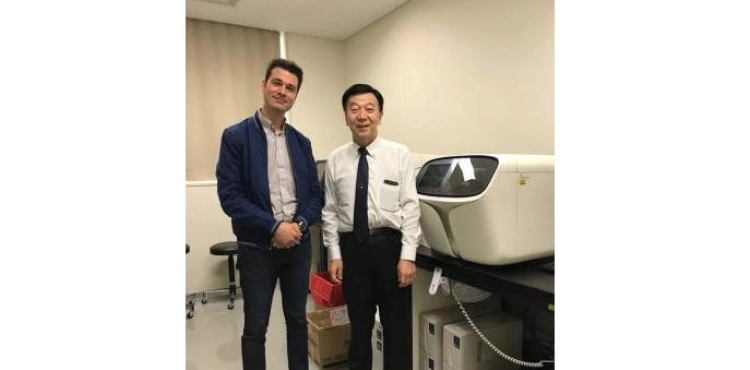RAMALLAH _ Palestine News Network
Dr. Yousef Mahmoud Salama, a scholar from an-Najah National university, recently joined a team of researchers from the Institute of Medical Sciences of the University of Tokyo in Japan, to find a new mechanisms capable of identifying protein and receptors found on cancer cells that cause the formation of skin cancer (melanoma).
Dr. Salama was the first author of the research paper, and a member of the research team of the University of Tokyo explored the idea of research.
"Melanoma " represents about one percent of skin cancers, but it causes the vast majority of deaths of this type of cancer, according to the American Cancer Society.
Melanoma tumors grow more frequently than others, most likely because of interactions between a pair of molecules, and through the propagation process known as (metastasis) tumors reach the lungs, liver, spleen and other body organs.
According to the experiments in mice and human cells, when injecting this type of cancer cells in mice has a large tumor which makes the injected rats die in less than a month, and is likely to regain the findings of the research team having a type of cancer treatment that has been abandoned Previously in clinical trials, the results indicate that one molecule is already linked to obesity and dementia as a possible cause of malignant tumor, or the spread of cancerous cells in other areas of the body.
It is also noteworthy that the Tokyo Medical University team led by associate Professor Betty Hessig has studied the protein (Plasminogen) and abbreviated as (TPA) over a long span of more than a decade, where the team found that cancer cells that produce protein (TPA) also produce large amounts of Receptors for this protein known as (LRP1), and through experiments the team found that inhibition of protein or receptor associated with it leads to a significant decrease in the spread of cancer cells significantly.
Dr. Yousef Salama is a graduate of the biotechnology Department of the Faculty of Science at an-Najah University in 2009, and due to his excellence as a research and teaching assistant at the university, before emit in 2012 to complete his postgraduate studies in Japan.
In Japan, Dr. Salama has been active in the field of cancer and stem cells, before becoming one of the finest researchers in this field, not only at the level of Japan, but also at the global level.
Dr. Salama says: "A better understanding of the specific interactions of LRP and TPA gives us hope that it will lead to a cure for cancers that result from the increased activity of protein TPA and at the same time be able to maintain the normal and healthy protein enzyme procedures in the body."
Dr. Salama also suggests that genetic treatment may be associated with cancer immunotherapy, when the mechanism of cancer is targeted using proteins and thus enabling the immune system to function and the result is to discourage and prevent the spread of cancer in the body.
Dr. Salama spoke on behalf of the research team explaining: "When we conduct experiments on mice by injecting them with genetically modified cancerous cells by deleting the genes that lead to the production of proteins TPA, LRP1, we found a noticeable interruption to the spread of cancerous cells, and thus the rats were able Live almost the same age as the natural mice that have not been injected with any type of cancerous cells ".
This new discovery is a quantum leap in creating a new mechanism that can reduce the spread of this type of high-risk, lethal cancer by discovering the correlation between TPA LRP1 proteins, and this discovery may put us on the threshold of a new therapeutic era based on the manufacture of drugs and medicines. New antibiotics can mainly target genetic mutations of tumors.
The new discovery was published in a renowned scientific journal in Molecular Genetics (The FASEB Journal), and Dr. Salama was named as the first publisher, and an Najah university was placed in the magazine.












